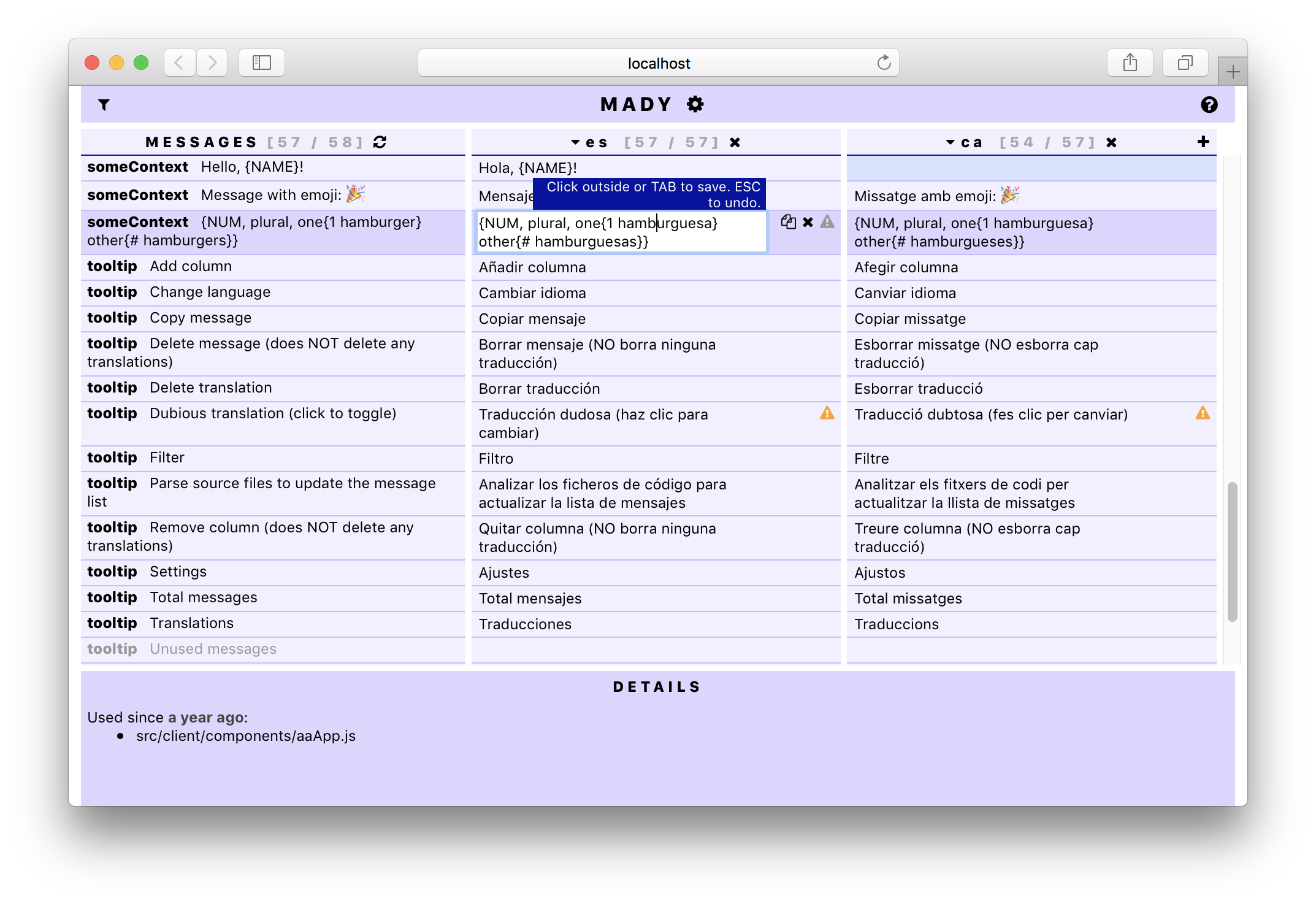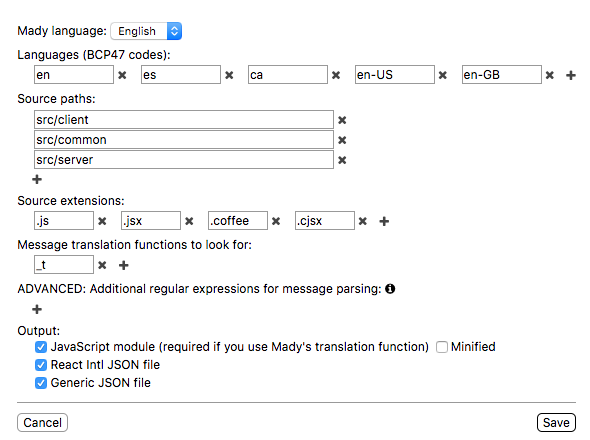Mady 
An easy-to-use tool to manage and translate ICU MessageFormat messages.

Yes, it's Mady's view of herself!
console.log(_t("someContext_{NUM, plural, one{1 hamburger} other{# hamburgers}}", { NUM: 1 }));
// 1 hamburguesa
console.log(_t("someContext_{NUM, plural, one{1 hamburger} other{# hamburgers}}", { NUM: 2 }));
// 2 hamburguesasRemember: this is not only for translation! Even if you only use English, you may need MessageFormat for gender, pluralisation and even regionalisation (regionalization).
Why?
- Easy-to-use tool for parsing source files, adding locales, editing translations, comparing locales side-by-side, and compiling to (optionally minified) JavaScript modules.
- Use it also as a library: a no-frills translation function to run the compiled language modules.
- React Intl interoperability, both for message extraction and translation injection.
- MessageFormat messages: while it does not solve all the problems in the huge field of i18n, MessageFormat is a much more powerful tool than the conventional gettext (IMHO).
-
Full UNICODE support: messages and translations can include any UNICODE character. In other words, you can now translate
👍 (en) as👏 (es-ES) and then💃 (es-ES-andalusia)! - BCP47 support: fetch missing translations from parent/child languages, and even sibling languages (other regions) as a last resort.
Installation
$ npm install --save mady
If you use React Intl, make sure you also install the following packages so that Mady can parse your React Intl components:
$ npm install --save-dev babel-plugin-react-intl babel-core
Then add the following line to your package.json file:
"scripts": {
"translate": "mady"
}or, if you want to store your locales in a specific folder (default: <project root>/locales):
"scripts": {
"translate": "mady --dir path/to/locales"
}Usage
There are two main parts in Mady: the web-based translation app and the translation function. The webapp is only needed during development (for the extraction, translation and management of messages and translations), whereas the translation function can be used in your own application, and hence in production as well.
The translation app
Access the translation app by running npm run translate. Mady will automatically launch in your default browser (default URL: http://localhost:8080). From the web application, you can:
- Update the message database with new messages extracted from your source files
- Configure your languages, source paths, file extensions, etc.
- Translate your keys to the different supported languages
- [Automatically] export translations to JS files and other formats, for use by the translation function, React Intl and other integrations
Messages in your source files might have the form: _t('someContext_Once upon a time...') (single or double quotes are supported), where _t() is the default name for the translation function (see below), someContext is some hint for the translator and Once upon a time... is your untranslated MessageFormat message.
Mady can also extract messages from React Intl components out of the box. Or you can specify your own regex patterns in the UI.
Configuration looks like this:

You can see the UI in English, Spanish and Catalan at the moment. Mady eats her own dog food.
The translation function
Using the translation function is similarly straightforward:
import _t from 'mady';
import locales from './locales/es';
_t.setLocales(locales);
console.log(_t('someContext_Once upon a time...'));
// Érase una vez...
console.log(_t('someContext_Number of items: {NUM}', { NUM: 5 }));
// Número de ítems: 5
console.log(_t("someContext_{NUM, plural, one{1 hamburger} other{# hamburgers} }", { NUM: 1 }));
// 1 hamburguesa
console.log(_t("someContext_{NUM, plural, one{1 hamburger} other{# hamburgers} }", { NUM: 2 }));
// 2 hamburguesasAlternatively, you can set up locales beforehand and then activate one or the other. In case the requested variant is not available, its closest BCP47 parent is enabled:
import _t from 'mady';
import locales from './locales/es';
_t.addLocales('es', locales);
const lang = _t.setLocales('es-US');
// returns 'es', since we don't have the American Spanish variant
const lang = _t.setLocales('fr');
// does nothing, since we have no French translationsBCP47 and translation fallbacks
Mady "fills in the gaps" when building translation modules ({lang.js}) and React Intl message bundles ({lang}.reactIntl.json). In other words, when you don't provide a translation for message X for a particular language (e.g. es-ES), it will look for suitable fallback translations in related languages:
- Parent languages (e.g.
es) - Sibling languages (e.g.
es-MX) - Children languages (e.g.
es-ES-andalusia)
If you use Mady's translation function and it cannot find a suitable translation, it will just take the message key (e.g. someContext_Untranslated message), remove the context prefix and use it as a last-resort fallback.
The locales folder
You can find the following files in the locales folder (./locales by default):
- A configuration file:
config.json - A message file:
keys.json - A raw translation file per language, e.g.
fr.json(this is the one you edit with the web application) - Several output files per language, depending on your configuration: a compiled translation module (
fr.js), a message bundle for React Intl (e.g.fr.reactIntl.json), or a generic JSON file (e.g.fr.out.json). All of these files are generated automatically.
MessageFormat
Mady uses the messageformat.js library by Alex Sexton, which "supports and extends all parts of the ICU MessageFormat standard (see the user guide), with the exception of the deprecated ChoiceFormat." IMHO, and while it does not solve all the problems in the huge field of i18n, it is a much more powerful tool than the conventional gettext.
Some examples of MessageFormat messages are given above (more here), but this does not even scratch the surface of what is enabled by this standard.
Internals
Mady is built with React and Relay, and is fully server-side-rendered. It was built as a proof-of-concept for the latest web technologies.
Changelog
Why Mady?
This library is named after my cousin, a brilliant person with an extraordinary talent for languages. I thank her for teaching me English when I was a little child.
License (MIT)
Copyright (c) Guillermo Grau Panea 2016
Permission is hereby granted, free of charge, to any person obtaining a copy of this software and associated documentation files (the "Software"), to deal in the Software without restriction, including without limitation the rights to use, copy, modify, merge, publish, distribute, sublicense, and/or sell copies of the Software, and to permit persons to whom the Software is furnished to do so, subject to the following conditions:
The above copyright notice and this permission notice shall be included in all copies or substantial portions of the Software.
THE SOFTWARE IS PROVIDED "AS IS", WITHOUT WARRANTY OF ANY KIND, EXPRESS OR IMPLIED, INCLUDING BUT NOT LIMITED TO THE WARRANTIES OF MERCHANTABILITY, FITNESS FOR A PARTICULAR PURPOSE AND NONINFRINGEMENT. IN NO EVENT SHALL THE AUTHORS OR COPYRIGHT HOLDERS BE LIABLE FOR ANY CLAIM, DAMAGES OR OTHER LIABILITY, WHETHER IN AN ACTION OF CONTRACT, TORT OR OTHERWISE, ARISING FROM, OUT OF OR IN CONNECTION WITH THE SOFTWARE OR THE USE OR OTHER DEALINGS IN THE SOFTWARE.